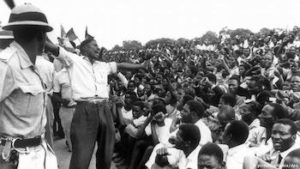
On this date in 1964, Zambia gained independence from Britain. This repaired the invasion of the 1884 Berlin Conference, the high point of white European competition for territory in Africa, a process commonly known as the Scramble for Africa.
With a population of over 9 million, Zambia is located in Southern Africa, east of Angola. Zambia's history goes back to the debut of Homo sapiens: evidence of human habitation going back 100,000 years has been found at Kabwe, north of Lusaka.
The Scottish explorer David Livingstone came to the area that is now Zambia in 1851. He was the first to see the falls he named Victoria, after Queen Victoria, in 1855.
In 1888, Cecil Rhodes, spearheading British commercial and political interests in Central Africa, obtained a mineral rights concession from local chiefs. In the same year, Northern and Southern Rhodesia, now Zambia and Zimbabwe, were proclaimed a British sphere of influence. The territory was administered by Rhodes' British South Africa Company, which signed treaties with several African leaders and administered the region. In 1911, the two were joined to form Northern Rhodesia.
In 1923, the United Kingdom took over the territory. In 1924, the administration of Northern Rhodesia was transferred to the British colonial office as a protectorate. A legislative council was established, of which five members were elected by the small European minority (only 4,000 people) but none by the African population.
During the 1920s and 1930s, advances and discoveries in copper and lead mining spurred development and immigration. By the late 1930s, about 4,000 European skilled workers and 20,000 African laborers were engaged there. By 1938, it produced 13% of the world's copper. The Anglo-American Corporation (AAC, North American) and the Rhodesian Selection Trust (RST, South African) immediately monopolized the sector, which they would control until independence.
Talk of merging the two Rhodesias had begun years before, but the British authorities halted it, and the war stopped it completely. Bad security conditions and increased taxes helped trigger a strike of African mineworkers in 1935, known as the Copperbelt Strike. Authorities crushed the strike, killing 13 miners.
Finally, in 1953, both Rhodesias were joined with Nyasaland (now Malawi) to form the Federation of Rhodesia and Nyasaland. Northern Rhodesia was the center of much of the turmoil and crisis that characterized the federation in its last years. At the core of the controversy were insistent African demands for greater participation in government and European fears of losing political control.
By 1960, the British Government, in the famous "There is a wind of change blowing through Africa" speech by Prime Minister Harold Macmillan, acknowledged that the days of colonial (or minority) rule on the continent were ending. The federation was dissolved on December 31, 1963, and Northern Rhodesia became the Republic of Zambia on October 24, 1964. Kenneth Kaunda became the country’s first president and proclaimed one-party rule.
The people were disappointed by one-party rule and the declining economy, and several strikes hit the country in 1981. The government arrested several union leaders, among them Frederick Chiluba. In 1986 and 1987, protests arose again in Lusaka and the Copperbelt, followed by riots over rising food prices in 1991, in which at least 30 people were killed. The same year, the state-owned radio claimed that the army had removed Kaunda from office. This was not true, and the coup attempt failed.
Kaunda realized the need for reform and lifted the ban on other political parties in 1990. Eleven new parties were quickly formed, among them the most important, the Movement for Multiparty Democracy (MMD), led by former union leader Frederick Chiluba. After pressure from the new parties, the referendum was canceled in favor of a direct multiparty election. In 1991, Fredrick Chiluba, the leader of the MMD, defeated Kaunda. The subsequent vote in 1996 saw obvious harassment of opposition parties, the year Chiluba was re-elected.
In the December 27, 2001 election, Chiluba's handpicked candidate, Levy Mwanawasa, was elected president with 29% of the vote; the MMD picked up 68 of 150 seats in the National Assembly. The vote was ruled flawed by international and local poll monitors, mainly on the grounds of misuse of state funds and vote-buying. An opposition petition to the Supreme Court alleged that the elections were rigged. n May 2003, under pressure from the church, women's, and other civil society groups, Mwanawasa conceded to forming a constituent assembly to review the constitution.
By mid-2003, the government considered participating in a future free trade area as part of the Southern Africa Development Community (SADC) arrangement. Food security and care for AIDS orphans and vulnerable children were also on the policy agenda. The government had also commenced the repatriation of some 5,000 Rwandan refugees. An estimated 1.2 million Zambians are HIV positive, with 21.5% of all adults between 15 and 49 years infected with the virus. Around 86% of Zambians are classified as poor, which impacts their nutritional status.
Levy Mwanawasa died in a Paris hospital after a stroke in June 2008 at 59. He had come to prominence recently for being one of the African leaders most critical of the violence in Zimbabwe. Rupiah Banda was sworn in as president after being declared the winner in the presidential election in November 2008.